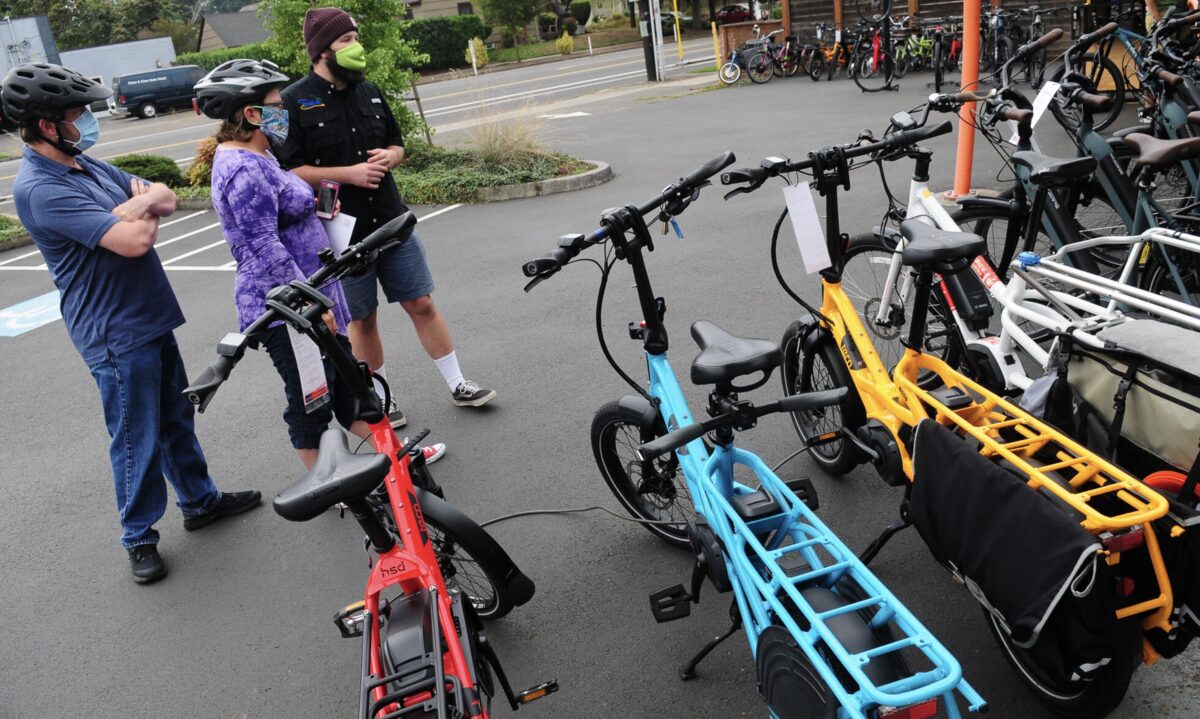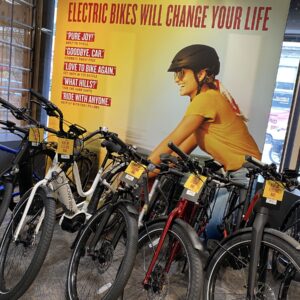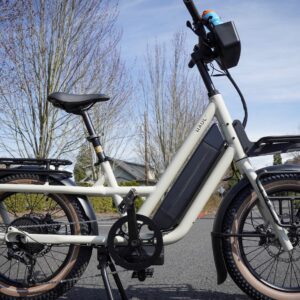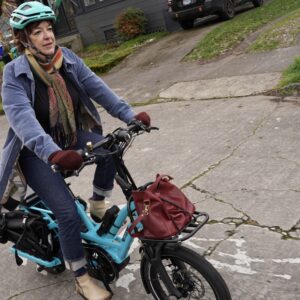
At a meeting of its Transportation Policy Advisory Committee (TPAC) on Friday (4/7), Metro made it clear they’d like to get into the e-bike purchase incentive game. They join the cities of Tigard and Portland, as well as Oregon lawmakers and the federal government in their enthusiasm to fill demand for e-bikes as weapons against climate change and as effective tools for personal and family mobility.
TPAC, which is made up of over a dozen technical staff from agencies and governments throughout the region, learned about the potential investment in e-bike access via a presentation about the federal Carbon Reduction Program. This $5.2 billion program was approved as part of President Joe Biden’s Bipartisan Infrastructure Law in November 2021 and is administered through the Federal Highway Administration (FHWA) with a goal to, “fund projects designed to reduce transportation emissions.”
Oregon will receive about $82.5 million total from the Carbon Reduction Program. The Oregon Department of Transportation will hand out about $54 million of that, and Metro estimates they’ll have about $18.8 million total to spend over five years. At the TPAC meeting Friday, Metro said they plan to award five years in one allocation process. As part of that effort, they’ve developed several draft packages of projects that will be refined by TPAC, the Joint Policy Advisory Committee on Transportation (JPACT, which is sort of a TPAC for elected officials), and Metro Council members.
Those draft packages were revealed publicly for the first time Friday.
Metro has come up with four different packages that would guide this $18.8 million allocation. Three of the four include a strong tilt toward transit projects because Metro used their Climate Smart Strategy plan as the backbone for Carbon Reduction Program decision-making and transit came very highly recommended through that process.
As you can see in the graphic from the TPAC presentation, Packages A, B, and C include four projects each, with three of those being transit-related: bus rapid transit on 82nd and Tualatin-Valley Highway, and a transit signal priority project on TriMet Line 33 (McLoughlin Blvd). The only difference in those three packages is a $3 million investment into a fourth project. Package A would fund an e-bike program, Package B would invest in Safe Routes to School projects, and Package C would put that $3 million into a general Active Transportation pot. Package D would fund five projects that just missed out on funding in a recent Metro federal active transportation funding process (known as the Regional Flexible Funding Allocation, or RFFA). All four packages would set-aside $1.8 million for Metro’s Climate Smart implementation program.
It was the $3 million e-bike program that caught my eye as something new.
Here’s what the Metro presentation said about what it could fund:
Potential elements include a subsidy/rebate program, promotional campaign, and transit access elements such as secured parking with charging stations. Potential partnerships with local agencies and non-profit organizations and coordination with potential state rebate program under consideration by the Oregon legislature.
According to Metro Resource Development Section Manager Ted Leybold, the specific type of program has yet to be determined. “At this point, it is only a conceptual investment to support deployment and use of electric powered bicycles,” shared Leybold in an email to BikePortland. The program would be further defined only if Package A is recommended by JPACT, TPAC and Metro Council.
No TPAC members objected to the e-bike program at Friday’s meeting. One of them, Indigo Namkoong who represents environmental justice nonprofit Verde, said she’s an e-bike user and “fan” but warned that the barrier to more e-bike riders in the northeast Cully neighborhood her organization works in isn’t just about cost. “It’s about infrastructure and feeling and experiencing safety on the roads,” Namkoong said. “We don’t have bike lanes in a lot of areas in our neighborhoods in Cully and surrounding areas… so safety infrastructure is one of the most important hurdles that we hear about.”
Metro staff will return to TPAC and other advisory bodies in the coming months to seek an official recommendation on which package should move forward. It’s a relatively tight timeline because Metro needs to have their decision to FHWA by November of this year.
If Package A and the e-bike investment program is prioritized, Leybold says there will be several issues to work through including: restrictions with federal funds (that prohibit direct subsidy for private vehicles, “so we would need to get creative on how to use the funds to support deployment and use while still being compliant,” Leybold said) and how best to coordinate with other e-bike funding programs already being considered by the Oregon Legislature and the City of Portland.
Lawmakers in Salem are currently considering a bill (House Bill 2571) that would offer rebates to e-bike buyers in the amount of $400 or $1,200. That bill passed out of its first committee on March 29th and is currently in a budget committee. And the City of Portland is likely to use revenue from the Clean Energy Fund (PCEF) to establish an e-bike rebate program of its own. As we reported last month, a PCEF committee has recommended $20 million to increase e-bike access over the next five years.
If HB 2571 becomes law, Metro’s $3 million e-bike investment could be added to the “Electric Bicycle Incentive Fund” that bill would create. Or it could be a standalone program.
In addition to these three e-bike incentive efforts, there’s also the federal E-BIKE Act that was just reintroduced to Congress late last month. If signed into law, the E-BIKE Act would offer individual consumers a refundable 30% tax credit for purchasing an electric bicycle — up to a $1,500 credit for new bicycles less than $8,000. The credit would be allowed once per individual every three years, or twice for a joint-return couple buying two electric bicycles. Income caps of of $150,000 annually for single filers, and $225,000 for heads of households, and $300,000 for those filing jointly would apply.
Watch this space in May for final decisions about these draft packages at Metro. Any allocations would have to be amended into the Metropolitan Transportation Improvement Program before they could be spent; but no matter how you slice it, buying an e-bike is very likely to become much easier in the coming months.








Thanks for reading.
BikePortland has served this community with independent community journalism since 2005. We rely on subscriptions from readers like you to survive. Your financial support is vital in keeping this valuable resource alive and well.
Please subscribe today to strengthen and expand our work.
Whenever I see an agency taking on lots of new missions (housing, vehicle subsidies, et. al.), I think that some senior executive is building a resume to run for governor.
How about funding a “clean and safe” program for our regional MUP’s? Would seem like a much better use of funds than promoting more consumption.
I love my ebike and think that ebikes have the opportunity to be transformational, but I’m having a hard time thinking an ebike incentive for private ebike ownership is a better option than Safe Routes to School, especially if the Safe Routes program does (or can?) include investments in infrastructure.
Maybe a hot take around here, but I’d rather see package C happen. Better transit and active transportation infrastructure will probably go a lot further getting people out of cars than an ebike subsidy. Those investments will also benefit the people who already use transit and bike/walk/scooter to get around. Let the state and feds worry about ebike incentives.
I am a supporter of e-bike rebate programs, but never above active transportation projects. We had all of those studies done asking people how they would feel about getting around on bike, and usually over 50% responded that they were interested but concerned about safety (Tigard 2040 TSP + others). That is IMO where we suffer the most – and any penny spent addressing another problem over the safe infrastructure issue is wasted opportunity. John Forester and Vehicular Cycling really set us behind on these kind of projects – we have a lot of catch-up to do.
I live in Tigard and ride bikes with my family so the Package D looks spicy to me. Setting aside my bias, I think BRT on TV Hwy and 82nd are sorely needed. TV Hwy bus ridership has had great numbers even after this pandemic age (WashCo Transit Study), and BRT could really do that hellish stroad a lot of good.
The cities and the state have “built it and people didn’t come.” Look at the numbers. Miles of infrastructure is being built, fewer people (percentage wise) use it. Ridership has been declining for years. This incentive may be a way to get more people out the door and out of their cars (when practical) and onto some of this infrastructure. I will say all municipalities need to do a better job keeping trails and paths clear of tents and their associated trashpiles.
When will we acknowledge that we’re still consuming a finite resource? After we’ve demonized every other fuel as “fossil”, when do we go after lithium?
All so Costco can make record profits cluttering up the garages of folks who’ll ride ’em twice and let ’em rot.
Lithium doesn’t get used up after the battery’s lifetime, it’s still all there and can be turned into a new battery, which is nothing like fossil fuels. Currently, that’s not widely adopted common practice (last I checked), but it seems very unlikely that it will always be cheaper / more feasible to mine new lithium than recycle existing old batteries.
Also I would be surprised if bikes forever use lithium batteries. The capacity of other chemistries even today is close enough to be useful (although right now people still go for lithium because it’s also cheap enough and is better).
But finally, any time this comes up, remember that a bike battery is in the vicinity of 1% the size of an EV car battery (depends which ones, etc). They’re tiny. And people are making the car batteries anyway. I don’t see how bike batteries will ever be a significant contributor to the overall demand of lithium unless our wildest dreams are realized and everyone has one and uses it all the time which frankly would be awesome.
Of course, it is a resource that needs to be mined, which is destructive, and recycling will have its own environmental impact that needs consideration. But all that is true for actual fossil fuels which bikes are trying to compete with.
Will any of these programs cover conversions? There’s a ton of emphasis on buying new e-bikes, but converting existing ones is probably a better carbon option.
Living next to a MUP and using it to walk to work I see e-bikes daily. And in not one case have I seen anyone pedaling an e-bike. For the majority they are not about cycling, they are about commuting and avoiding traffic by using bike lanes and MUPs.